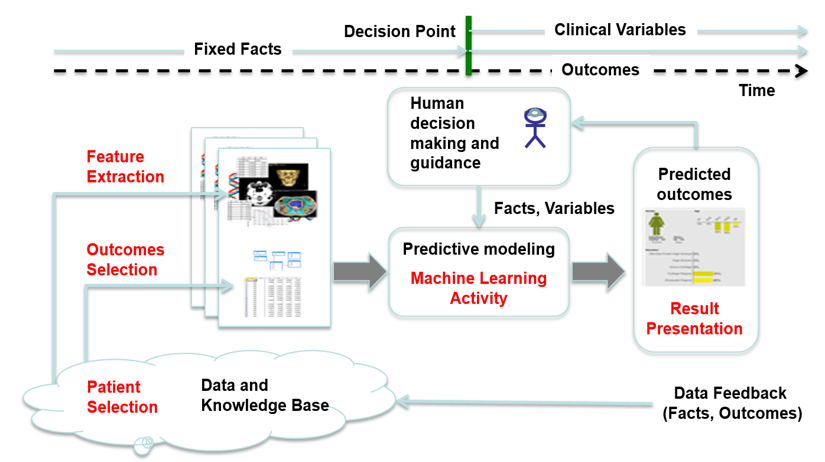Overview
Oncospace Abstract: Big Data and Opportunities for Oncology
Today, the “gold standard” for determining best practices in radiation oncology patient care is randomized
clinical trials. Unfortunately, these represent less than 5% of the total patient population and take years
to produce results. Furthermore, clinical trials are designed to address a very narrowly-defined research
question and thus don’t provide much useful information about patients who do not match the trial criteria.
To gain insights into a wider spectrum of patients, many centers maintain data registries, where forms are
filled out with information required by the registry protocol. This can be a laborious process that limits
the volume of data collected. Neither clinical trials nor patient registries are designed to guide the treatment
of individual patients, each with a very specific condition and set of treatment parameters. What is needed is
collection of detailed information for all radiation oncology patients, throughout each stage of treatment and
follow-up, creating a knowledge base that itself is continually “learning”.
The clinical workflow in radiation oncology has multiple stages from simulation, to treatment planning, to
daily recording of treatments and follow-up visits. Throughout this process there are many opportunities to
collect information that helps form meaningful links between how a patient is treated and the subsequent
successes and failures in terms of outcomes like disease control and radiation-related complications. This
data can provide not just useful insights, but can significantly impact and improve the treatment strategy
used for each individual patient.

Currently, clinical practice lacks the structured, mineable collection of much of the point-of-care data
required for a personalized medicine approach. That is, although much potentially useful information is stored
within disparate clinical systems, it is not brought together into a form that we can turn into a knowledge base.
Also, there is a lack of software applications available to evaluate and learn from the clinical data. Today,
in clinical trial scenarios, we have many studies looking at anatomical, functional and molecular image data to
better characterize disease. We use pathology, and potentially, genetic features to better understand the nature
of a patient’s clinical condition. We analyze radiation dose distributions, fractionation patterns and patient
motion to understand how it impacts treatment outcome. We consider the impact of concurrent chemo- and hormonal
therapies in addition to surgery. But true precision medicine demands that we routinely aggregate and analyze
these sorts of data to create a knowledge database.
Big data in Healthcare refers to the practice of collecting and analyzing immense amounts of medical data to
benefit patient care. Radiation oncology is a heavily data-driven practice, and ideally suited for Big Data
applications. A vast amount of untapped knowledge related to radiotherapy is contained within the clinical
data. However, this data is most useful when it is structured, curated and easily accessible for analysis.
Oncospace is an initiative to turn that vision into reality. The project started in 2007 with a view to
a) create one of the largest structured, curated and sharable databases of radiotherapy clinical data,
and b) to create decision support applications, using machine learning and other methods, for physicians
to develop personalized treatment pathways. At its core, Oncospace is a collaborative platform to drive
multi-institutional research using clinical data for Precision Medicine. Imagine if physicians could simply
issue a query to retrieve the dose distributions for all of their patients experiencing a specific complication
and compare them to patients with the same disease classification but without the complication. Retrospective
studies on a clinic’s data could be done in minutes with database queries rather than via months of manual data
collection. Precise treatment solutions could be produced in seconds for an individual patient, versus the usual
method of applying one-size-fits-all treatment protocols derived from years-old publications.
The Oncospace platform consists of several components:
-
Data extraction and curation modules designed to seamlessly collect information on patients within a clinical workflow, for future analysis and predictions.
-
A data warehouse designed for efficient retrieval of relevant data via a simple query.
-
Fully-developed web services to support web-based access with special emphasis on security to protect patient privacy.
-
An intuitive human interface designed to ask clinically relevant questions of the data and present the answers to care providers during the process of planning a patient’s care.
-
Statistical analysis and other decision support tools to gain deeper insights from real-life clinical data that is more representative of routine practice than a typical clinical trial.
Topics